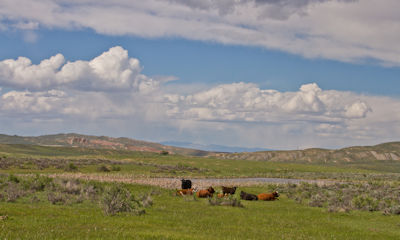
.jpg?width=150&auto=webp&quality=80&disable=upscale)
There's plenty of regulatory lunacy about with administrative agencies charged with all manner of power gallivanting about the countryside in search of something to control, manage, whatever. None is so egregious as the Clean Water Act that empowers the EPA and the Army Corps of Engineers to make determinations on "navigable" waters and control them as "waters of the United States."
In our July issue, Melissa Hemken offers some background on Waters of the United States - WOTUS as most of us call it - and concerns about new rules that could expand the reach of EPA and the Army Corps of Engineers.

A LITTLE HELP: The Supreme Court has ruled that someone accused of violating Clean Water Act rules can litigate against the Army Corps. of Engineers and EPA. (Photo: Melissa Hemken)
Recently, the U.S. Supreme Court issued a unanimous opinion on a case against the Army Corps of Engineers deciding in favor of the defendants. Essentially when the Army Corps makes a determination that water is classed as WOTUS, you don't have a lot of rights to fight the ruling. In fact the federal government had maintained that judicial review was not an option for landowners under the Clean Water Act.
So a regulatory body can claim something and you have little room to fight? Chief Justice Roberts rejected the federal government's position noting that judicial review of these findings should be available before EPA "drops the hammer" on a group. Note that if you're found in violation of the Clean Water Act the fine is $37,500 for each day you're held in violation of the Act.
Of interest is the fact that all eight justices concurred with Roberts, but three - Justice Anthony Kennedy, joined by Clarence Thomas and Samuel Alito, wrote separately to criticize what they called the "ominous reach" of the Clean Water Act itself. One legal blogger notes that this criticism may invite future litigants to file more property rights cases against the Clean Water Act.
Zippy Duvall, president, American Farm Bureau Federation, issued a statement noting that the court decision "removes a huge roadblock that has prevented landowners from obtaining relief from the courts when the Corps illegally claims their land is federally regulated water. Now, farmers and ranchers can have their day in court when the government tells them they cannot plow a field or improve a ditch without a federal permit."
Rise of the regulators
Longer ago than I care to remember, I was taking a business law class when the professor observed that within a decade a majority of rules that governed our lives would be created by administrative bodies, not people we elected to office.
Looks like the farmers and ranchers of the West know that more than anyone whether you're talking WOTUS, the Sage Grouse or Bison management in Yellowstone. The challenge with that? No one in EPA, the Army Corp of Engineers or any other regulatory body has to answer to voters.
Independence from politics is only a good thing when there can be a check and balance in the system. Regulatory agencies in this country are running unchecked developing rules that govern even the smallest part of our lives. It's a challenge we'll have to deal with but at least some folks in the Supreme Court are paying attention.
That helps.
About the Author(s)
You May Also Like




